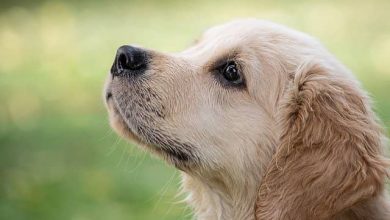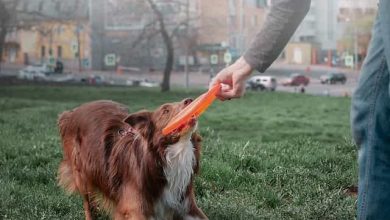Great Pyrenees: The Majestic Big White Fluffy Dog Breed and Its Unique Characteristics
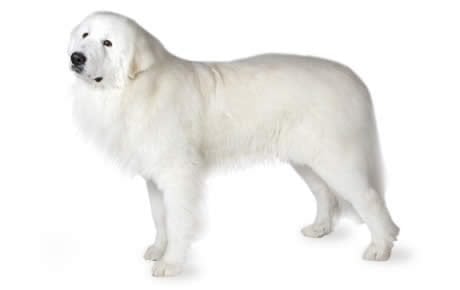

Great Pyrenees are a majestic dog breed that are known for their big, white, fluffy coats and their loyalty and dedication to their families. They are often referred to as the “gentle giants” of the dog world due to their size and calm temperament. In this article, we will take a closer look at the unique characteristics of Great Pyrenees and why they make such wonderful pets.
The Great Pyrenees Big White Fluffy Dog Breed
Great Pyrenees are a large breed of dog that originated in the Pyrenees Mountains of Europe. They were originally bred as livestock guardians, and their size and protective instincts make them ideal for this role. Great Pyrenees have a thick double coat that is predominantly white, although they may have patches of other colors such as tan or gray. Their fur is thick and fluffy, which helps keep them warm in cold weather.
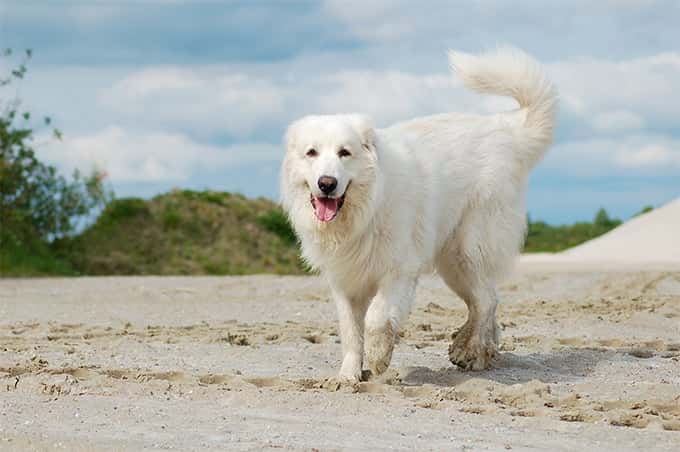
Unique Characteristics of Great Pyrenees Big White Fluffy Dog
Great Pyrenees have several unique characteristics that set them apart from other breeds of dogs. Here are some of their most notable traits:
- Loyal and protective: Great Pyrenees are fiercely loyal to their families and are known for their protective instincts. They will do whatever it takes to keep their loved ones safe, whether that means standing guard or intervening in a potentially dangerous situation.
- Independent: Great Pyrenees are independent dogs that are used to making decisions on their own. They are not typically highly trainable, but they are intelligent and can learn basic obedience commands.
- Calm temperament: Despite their size and protective instincts, Great Pyrenees are generally very calm and gentle dogs. They are great with children and make wonderful family pets.
- High exercise requirements: Great Pyrenees are a large breed of dog and require plenty of exercise to stay healthy and happy. They enjoy long walks and hikes, as well as playing in a secure yard.
- Health concerns: Like all breeds of dogs, Great Pyrenees are prone to certain health conditions. These may include hip dysplasia, bloat, and skin allergies.
Feeding Great Pyrenees Big White Fluffy Dog
Great Pyrenees require a high-quality diet that is tailored to their unique nutritional needs. They are a large breed of dog, which means that they need plenty of protein and other nutrients to maintain their muscle mass and overall health. It is important to choose a dog food that is specifically formulated for large breed dogs, as this will ensure that they are getting all of the nutrients they need in the right amounts.
Fiber-Rich Dog Food for Great Pyrenees
In addition to a high-quality diet, Great Pyrenees can benefit from a fiber-rich dog food. Fiber is important for digestive health and can help prevent constipation and other digestive issues. Fiber-rich dog foods can also help your Great Pyrenees feel full and satisfied, which can be helpful for weight management.
When choosing a fiber-rich dog food for your Great Pyrenees, it is important to look for one that is specifically formulated for their breed and size. You should also choose a food that is made with high-quality ingredients, such as whole grains, fruits, and vegetables. Be sure to read the ingredient list carefully and avoid any foods that contain fillers, by-products, or artificial preservatives.
Some FAQs Related to the Great Pyrenees Big White Fluffy Dog Breed
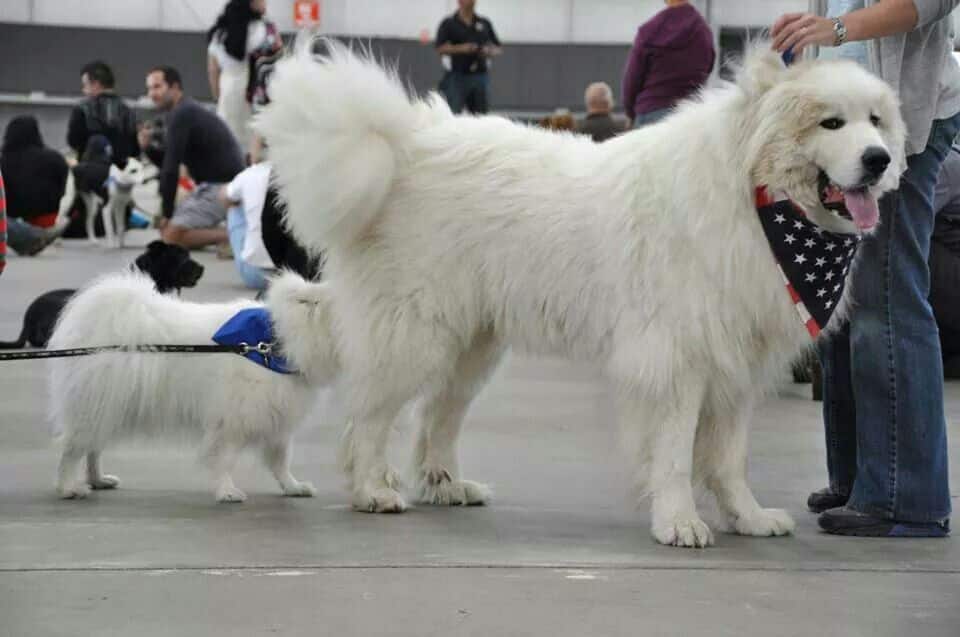
Here are some of the most FAQs related to the great Pyrenees big white fluffy dog:
Is a Great Pyrenees a good house dog?
Great Pyrenees can make great house dogs for the right family. While they are large and need plenty of space to move around, they are generally calm and laid-back indoors. They also have a protective nature and make excellent watchdogs, alerting their owners to any potential threats. However, there are some important considerations to keep in mind when deciding if a Great Pyrenees big white fluffy dog breed is the right fit for your home.
How big do Great white Pyrenees get?
Great Pyrenees are a large breed of dog, typically weighing between 85 and 115 pounds and standing 25 to 32 inches tall at the shoulder. Some Great Pyrenees may be even larger, with males typically weighing more than females. It’s important to note that proper nutrition and exercise can play a big role in a Great Pyrenees’ growth and overall health, so it’s important to consult with a veterinarian to ensure they are growing and developing appropriately.
What is a large white dog that looks like a Great Pyrenees?
There are a few dog breeds that share similarities in appearance with Great Pyrenees. One such breed is the Kuvasz, which is also a large, white, and fluffy dog with a protective nature. Other breeds that may resemble Great Pyrenees Big White Fluffy Dog breed includes the Maremma Sheepdog, the Anatolian Shepherd, and the Akbash. However, it’s important to note that each breed has its own unique characteristics and traits, so it’s important to do research and meet the dog before making any decisions about bringing one into your home.
See also: Great Pyrenees Golden Retriever Mix New facts
What is the big white fluffy dog breed called?
The big white fluffy dog breed is called the Great Pyrenees. It is a large breed of dog that is known for its thick, fluffy white coat and gentle disposition. Great Pyrenees are often used as livestock guardians due to their protective nature, but they also make wonderful family pets for those who have space for a large dog and are willing to put in the time and effort to properly train and socialize them.
Is a Great Pyrenees bigger than a wolf?
Adult Great Pyrenees are generally larger than wolves, although there can be some variation in size between individual animals. On average, male Great Pyrenees can weigh between 100 to 160 pounds, while females typically weigh between 85 to 115 pounds. In comparison, the average weight of a wild gray wolf can range from 70 to 110 pounds, with males typically weighing more than females. However, it’s important to note that size alone is not the only factor to consider when comparing these two animals, as they have different physical characteristics and behaviors.
Will Great Pyrenees protect you?
Great Pyrenees are natural protectors and are known for their strong protective instincts. They were originally bred to guard flocks of sheep and were often left alone to protect the herd from predators, such as wolves and bears. As a result, Great Pyrenees Big White Fluffy Dog have a strong sense of loyalty and will naturally protect their family and home from perceived threats.
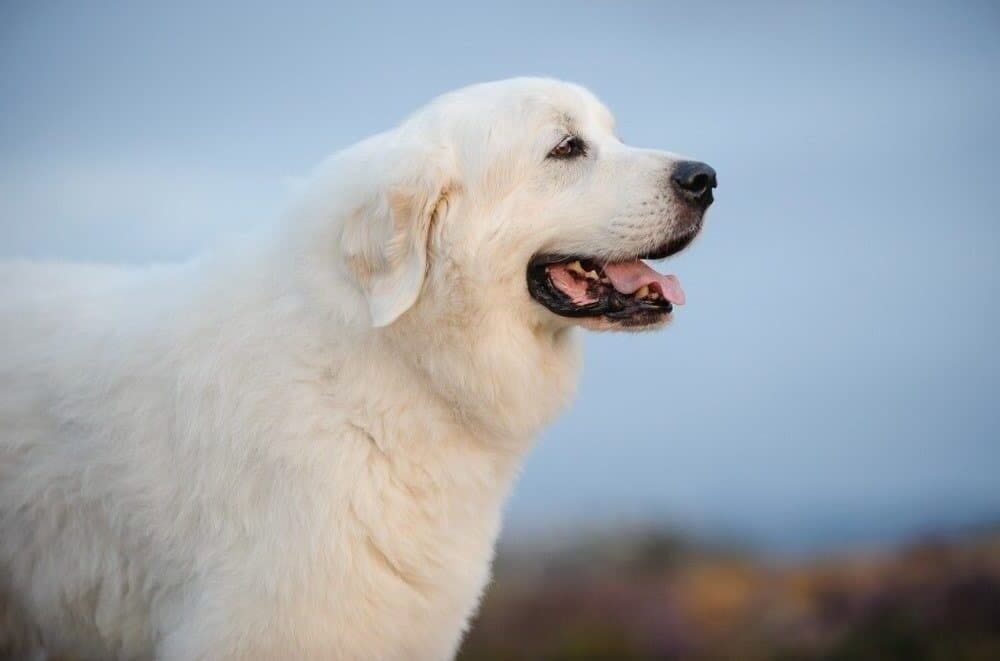
That being said, it’s important to remember that every dog is an individual, and their behavior can be influenced by factors such as socialization, training, and environment. Proper training and socialization can help ensure that your Great Pyrenees behaves appropriately in different situations and learns to differentiate between real threats and perceived ones. Additionally, it’s important to provide your Great Pyrenees Big White Fluffy Dog with plenty of exercises and mental stimulation to help prevent behavioral issues from developing.
Do Great Pyrenees bark a lot?
Yes, Great Pyrenees are known for being vocal dogs and tend to bark quite a bit. This is partly due to their protective instincts, as they may bark to alert their owners of potential threats or to deter intruders from approaching their territory. However, excessive barking can be a problem if it becomes a nuisance to neighbors or if it indicates an underlying behavioral issue.
How smart are Great Pyrenees dogs?
Great Pyrenees are generally considered to be intelligent dogs, but they can be independent and stubborn at times. They were originally bred to work independently as livestock guardians and needed to be able to make decisions on their own to protect their flocks. This independence can sometimes make them difficult to train, as they may not always follow commands or listen to their owners.
However, with consistent and patient training, Great Pyrenees can learn a variety of commands and tricks. They are also known for their problem-solving abilities and can be quick to learn new skills when motivated by food or positive reinforcement.
See also: Does a dog need a hat in the winterIt’s important to note that every dog is an individual and can vary in intelligence and trainability based on their genetics, personality, and life experiences. Some Great Pyrenees may be more eager to learn and obedient, while others may be more independent and require more patience and effort in training.
Can Great Pyrenees Big Fluffy Dog be left alone?
Great Pyrenees dogs are known for their independent nature and their ability to guard their home and family. While they are capable of spending time alone, it is not recommended to leave them alone for extended periods of time. Great Pyrenees dogs can become destructive and may develop separation anxiety if left alone for too long. It is important to provide them with enough exercise, mental stimulation, and attention to prevent any behavioral issues. If you need to leave your Great Pyrenees alone, it is recommended to gradually train them for short periods of time and to provide them with a safe and comfortable environment.
What is the biggest dog on earth?
The biggest dog breed in the world is the English Mastiff, which can weigh up to 220 pounds and stand over 30 inches tall at the shoulder. However, the heaviest dog ever recorded was a St. Bernard named Benedictine, who weighed 357 pounds. It’s worth noting that while some individual dogs may be larger than others, it’s important to focus on a dog’s health and well-being rather than their size.
How long do Great Pyrenees Big White Fluffy Dog live?
On average, Great Pyrenees dogs have a lifespan of around 10 to 12 years. However, with proper care and attention, some Great Pyrenees dogs have been known to live up to 15 years or more. Like all dogs, the lifespan of a Great Pyrenees can be influenced by a variety of factors, including genetics, diet, exercise, and overall health. Regular veterinary check-ups, a healthy diet, and plenty of exercise and mental stimulation can help to ensure that your Great Pyrenees lives a long and healthy life.
What is a teddy bear dog breed?
A teddy bear dog breed is a type of dog that is bred to look like a teddy bear. These dogs are typically small to medium-sized and have fluffy and curly fur, round ears, and a cute and cuddly appearance. Some common teddy bear dog breeds include the Shih Tzu, Bichon Frise, Poodle, and Pomeranian. While these dogs are often bred for their adorable appearance, it is important to note that they still require proper care, training, and attention like any other dog breed.
What dog is bigger than a Great Pyrenees Big White Fluffy Dog breed?
There are several dog breeds that are larger than the Great Pyrenees. Here are a few examples:
- English Mastiff: This breed can weigh up to 220 pounds and stand over 30 inches tall at the shoulder.
- Saint Bernard: These dogs can weigh up to 180 pounds and stand up to 30 inches tall at the shoulder.
- Irish Wolfhound: This breed can weigh up to 180 pounds and stand up to 32 inches tall at the shoulder.
- Tibetan Mastiff: This breed can weigh up to 160 pounds and stand up to 33 inches tall at the shoulder.
It’s worth noting that while some individual dogs may be larger than others, it’s important to focus on a dog’s health and well-being rather than its size.
Are the Great Pyrenees Big White Fluffy Dogs expensive?
The cost of a Great Pyrenees dog can vary depending on various factors such as the breeder’s location, reputation, the dog’s age, pedigree, and other related expenses such as vet care, food, and grooming. On average, a Great Pyrenees puppy can cost between $500 to $2000 USD, while an adult Great Pyrenees can cost between $300 to $500 USD. However, it’s important to remember that the cost of owning a dog goes beyond the initial purchase price and includes ongoing expenses like food, grooming, vet care, and training. It’s essential to do your research and find a reputable breeder who can provide you with healthy and well-socialized Great Pyrenees.
See also: 10 Popular Beagle Mixed Breeds You Need to Know AboutAre the Great Pyrenees Big White Fluffy dogs rare?
Great Pyrenees Big White Fluffy dogs are not considered rare, but they are not as common as some other dog breeds. They are a popular breed in their native region of the Pyrenees Mountains, which is located between France and Spain, but they are less common in other parts of the world. However, Great Pyrenees dogs can be found in many countries and are recognized by major kennel clubs, including the American Kennel Club (AKC) and the Kennel Club (UK). If you are interested in adopting a Great Pyrenees, it’s recommended to do your research and find a reputable breeder or rescue organization.
Is a Great Pyrenees hyper?
Great Pyrenees dogs are not typically hyperactive. In fact, they are known for their calm and laid-back demeanor. Great Pyrenees are independent and can be stubborn, but they are also intelligent and can be trained with patience and positive reinforcement. They are generally mellow and enjoy lounging around the house or yard, but they do require regular exercise and mental stimulation to stay healthy and happy. A tired Great Pyrenees is usually a well-behaved and content Great Pyrenees. It’s important to provide them with plenty of opportunities for exercise and play, but it’s also important to avoid over-exercising them, especially when they are still growing, as they are prone to joint issues.
Are the Great Pyrenees bigger than golden retrievers?
Yes, Great Pyrenees dogs are typically larger than Golden Retrievers. Great Pyrenees dogs are a large breed, standing between 25-32 inches (63-81 cm) at the shoulder and weighing between 85-115 pounds (39-52 kg) on average. Golden Retrievers, on the other hand, are a medium-sized breed, standing between 21-24 inches (53-61 cm) at the shoulder and weighing between 55-75 pounds (25-34 kg) on average. While individual
Do Pyrenees dogs cuddle?
Yes, Great Pyrenees Big White Fluffy dogs are known to be affectionate and love to cuddle with their owners. They are gentle and loving dogs that thrive on human companionship and attention. They are also known to be protective of their families, so they may try to lean on or sit close to their owners to show their affection and to provide a sense of security. However, it’s important to remember that Great Pyrenees are large dogs, and their cuddles can be quite powerful, so it’s essential to ensure that both you and your dog are comfortable and safe during cuddle time.
Some popular dog products from Amazon to buy:
Bnonya Orthopedic Dog Bed
Greenies Dental Chews for Dogs
Heart Recipe Dog Treats
Chicken Poppers Dog TreatsDo Great Pyrenees love their owners?
Yes, Great Pyrenees Big White Fluffy dogs are known for their deep affection and loyalty towards their owners. They are gentle giants that are known to be devoted to their families and are often described as “nanny dogs” because of their protective nature towards children. Great Pyrenees dogs thrive on human companionship and attention and love to spend time with their owners. They can be independent at times, but they are generally affectionate and loving pets. With proper socialization and training, Great Pyrenees can form strong bonds with their owners and become loyal and devoted companions.
Do Great Pyrenees need a bed?
Yes, Great Pyrenees Big White Fluffy dogs need a comfortable bed to rest and sleep on. They are large dogs and require a bed that is big enough for them to stretch out comfortably. Providing your Great Pyrenees with a bed of their own can help them feel safe and secure and can also help protect your furniture and floors from scratches and fur. It’s essential to choose a bed that is sturdy, durable, and easy to clean, as Great Pyrenees can shed quite heavily and may drool in their sleep. You can choose from a variety of dog bed options, including traditional dog beds, orthopedic beds, elevated beds, and more, depending on your dog’s needs and preferences.
Conclusion
The great Pyrenees Big White Fluffy Dog breed is known for its loyalty, protectiveness, and gentle nature. They have unique characteristics that make them ideal for certain types of households, and they require a high-quality diet that is tailored to their specific nutritional needs. If you are considering adding a Great Pyrenees to your family, be sure to do your research and choose a breeder or rescue organization that specializes in this breed.

